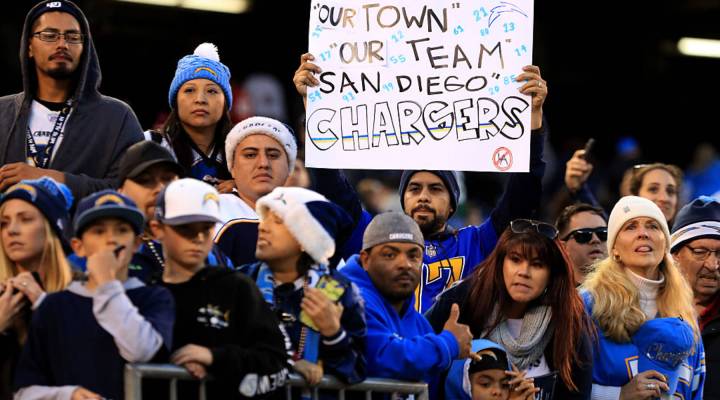
5 economic takeaways about the Chargers’ move to Los Angeles
5 economic takeaways about the Chargers’ move to Los Angeles

Dean Spanos, the billionaire who owns the Chargers, thinks getting into the Los Angeles market is going to pay off. But with the Rams in L.A. already, the Chargers won’t be the only NFL franchise in town. So will fans actually show up to games and spend money on yet another team’s gear?
Allen Sanderson, economics professor at the University of Chicago, said this move isn’t really about the Chargers or the Rams.
“I think the National Football League needs Los Angeles more than Los Angeles needs the NFL,” he said. In other words, the NFL wants as much presence as they can get in the nation’s second-largest media market. But a move like this comes with some challenges. Here are just a few of the things the Chargers are up against:
Having two NFL teams in the big market like Los Angeles doesn’t make as much sense as it does for other professional sports leagues. Other sports, like pro baseball, basketball and hockey, make a lot of their money through local advertising and broadcast rights. The NFL’s different. The league and its franchises makes most of their money from nationwide TV contracts. Fox, ESPN, CBS and NBC pay lots of money to broadcast the games. Then, advertisers pay those broadcasters a lot of money for commercials. The teams then split the profits evenly. There’s not a huge benefit for the team to be in a bigger market.
The L.A. sports market is a tough one to break into, given how many pro teams are already there. (See: Lakers, Clippers, Dodgers, Angels, Kings, Ducks and, of course, the Rams.) In San Diego, the only other pro sports team was the MLB’s Padres. The Chargers will now have to compete with more teams for sports fans, and fan dollars. “The number one thing is, how are they going to do those things which create brand loyalty in virtually a new market,” said Ken Ungar, the president of Charge, a sports marketing firm.
The Rams and Chargers are going to compete with college football for fan loyalty. It’s not just pro teams. The most well-known Los Angeles college teams — University of Southern California (USC) and University of California, Los Angeles (UCLA) — are basically semi-pro teams. They have huge followings and those fans are already spoken for, Sanderson said
The franchises are going to have to figure out a way to split stadium revenue. While franchises make most of their money from national TV contracts, they also make money selling naming rights on the building. “A team like the Dallas Cowboys might have $250 million more revenue than a team like the Kansas City Chiefs because a lot of the revenue generated in the NFL are stadium revenues,” said Andrew Zimbalist, a professor of economics at Smith College. “You not only have ticket revenues, but you have concessions income, catering income and signage income. There are going to be financial agreements that will be bargained over very vigorously by both sides, but once you reach an agreement, it’s going to be viable.”
One last thing to think about: the move might actually be good news for San Diego. First, the local economy there won’t take a major hit because of boring old economics.An explainer from Craig Depken,a professor of economics at UNC-Charlotte: “The substitution effect is really dominant. Much of the local spending will just be moved from one source of relaxation and leisure, that is, going to a football game, to another source could be going swimming or skiing or whatever else.”
Second, according to Sanderson, the residents of San Diego are actually the biggest winners of this move — they’re not going to have to pay for new stadiums with their tax dollars.
There’s a lot happening in the world. Through it all, Marketplace is here for you.
You rely on Marketplace to break down the world’s events and tell you how it affects you in a fact-based, approachable way. We rely on your financial support to keep making that possible.
Your donation today powers the independent journalism that you rely on. For just $5/month, you can help sustain Marketplace so we can keep reporting on the things that matter to you.












